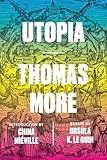Utopia /
Material type: TextPublication details: London : Verso, 2016Edition: [New edition] / introduction by China Mi�eville ; essays by Ursula K. Le GuinDescription: 216 pages ; 21 cmContent type: text Media type: unmediated Carrier type: volumeISBN: 9781784787608 (pbk.) :Subject(s): Utopias | Politics and GovernmentDDC classification: 321.07 LOC classification: HX810.5Summary: Five hundred years since its first publication, Thomas More's astonishingly radical 'Utopia' continues to shape speculative fiction today. More imagines a perfect island nation where thousands live in peace and harmony, men and women are both educated, and all property is communal. Through dialogue and correspondence between the protagonist Raphael Hythloday and his friends and contemporaries, More explores the theories behind war, political disagreements, social quarrels, and wealth distribution and imagines the day-to-day lives of those citizens enjoying freedom from fear, oppression, violence and suffering. This vision of an ideal world is also a scathing satire of Europe in the sixteenth century and has been hugely influential since publication, shaping utopian fiction even today.
TextPublication details: London : Verso, 2016Edition: [New edition] / introduction by China Mi�eville ; essays by Ursula K. Le GuinDescription: 216 pages ; 21 cmContent type: text Media type: unmediated Carrier type: volumeISBN: 9781784787608 (pbk.) :Subject(s): Utopias | Politics and GovernmentDDC classification: 321.07 LOC classification: HX810.5Summary: Five hundred years since its first publication, Thomas More's astonishingly radical 'Utopia' continues to shape speculative fiction today. More imagines a perfect island nation where thousands live in peace and harmony, men and women are both educated, and all property is communal. Through dialogue and correspondence between the protagonist Raphael Hythloday and his friends and contemporaries, More explores the theories behind war, political disagreements, social quarrels, and wealth distribution and imagines the day-to-day lives of those citizens enjoying freedom from fear, oppression, violence and suffering. This vision of an ideal world is also a scathing satire of Europe in the sixteenth century and has been hugely influential since publication, shaping utopian fiction even today.
| Item type | Current library | Call number | Status | Date due | Barcode | Item holds |
|---|---|---|---|---|---|---|
 Books
Books
|
Main Library Non-Fiction - General Stacks | 321.07 .M836 2016 (Browse shelf (Opens below)) | Available | 31428 |
Includes bibliographical references.
Five hundred years since its first publication, Thomas More's astonishingly radical 'Utopia' continues to shape speculative fiction today. More imagines a perfect island nation where thousands live in peace and harmony, men and women are both educated, and all property is communal. Through dialogue and correspondence between the protagonist Raphael Hythloday and his friends and contemporaries, More explores the theories behind war, political disagreements, social quarrels, and wealth distribution and imagines the day-to-day lives of those citizens enjoying freedom from fear, oppression, violence and suffering. This vision of an ideal world is also a scathing satire of Europe in the sixteenth century and has been hugely influential since publication, shaping utopian fiction even today.

